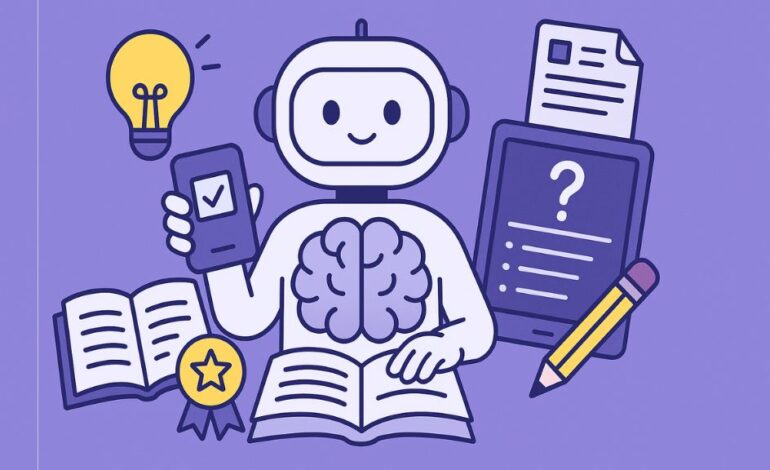
Table of Contents
ToggleIn academia, research paper writing can be both exciting and overwhelming. Juggling literature reviews, complex data, citations, and formatting is no small feat. But with AI research paper generators, students and researchers can streamline the entire process—from brainstorming to submission—while boosting efficiency, quality, and confidence.
Whether you’re working on a dissertation or preparing a journal article, these tools offer smart features like summarization, citation management, plagiarism checking, and automated formatting. Ready to elevate your academic writing? Here are the 20 best AI research paper generators for 2025, complete with reviews, key benefits, and direct access links.
Best AI Research Paper Generators
Jasper AI
Best for: High-quality academic content
Jasper AI leverages advanced GPT-3/4 technology to generate academic content tailored to your needs. With customizable tone and structure, Jasper can help you draft introductions, literature reviews, and even complex discussions in minutes. It also integrates with plagiarism checkers and citation managers for seamless academic integrity.
If you want content that feels natural and adheres to academic conventions, Jasper AI is a top pick. Whether you’re a seasoned researcher or a student, Jasper helps you stay focused on ideas rather than formatting and syntax. With features like Grammarly integration, your research papers will always be polished and publication-ready.
Scribbr
Best for: Comprehensive editing and formatting
Scribbr offers a powerful blend of AI tools and human expertise. Its AI editor handles spelling, grammar, and plagiarism detection, while expert editors review your work for clarity and style. Scribbr’s citation generator supports APA, MLA, and Chicago styles, taking the stress out of referencing.
The platform is especially helpful for students seeking flawless formatting and academic guidance. With its robust plagiarism checker, Scribbr ensures that your work is unique and credible. Scribbr also delivers valuable feedback for thesis writers, helping you refine arguments and improve your paper’s overall quality.
Wordtune Scholar
Best for: Rewriting and refining academic writing
Wordtune Scholar excels at paraphrasing, clarifying, and enhancing academic prose. Its AI engine suggests alternate phrasing, improves sentence flow, and helps you present complex ideas more clearly. Whether you’re rewriting abstracts or refining literature reviews, Wordtune Scholar can elevate your research language.
For non-native English speakers and busy academics alike, this tool removes barriers to high-impact writing. Wordtune Scholar also provides source recommendations and academic tone improvements, ensuring your paper is both credible and compelling. It’s perfect for those who want their ideas to shine.
Typeset.io
Best for: Automated formatting for journals
Typeset.io takes the hassle out of formatting your research paper. Choose from thousands of journal templates and let the AI handle headings, citations, figures, and tables. This tool also provides automated LaTeX exports, making it a favorite for researchers aiming for seamless publication.
Typeset ensures compliance with journal requirements—no more endless formatting revisions. Its built-in citation manager and auto-formatting features free you from technical distractions, so you can focus on research. For anyone submitting to academic journals, Typeset is a game-changer.
ResearchRabbit
Best for: Visualizing research topics
ResearchRabbit lets you visually map research topics, track citations, and discover connected papers with ease. Its intuitive interface helps you build literature reviews and monitor the latest trends in your field.
AI-driven visualization and topic mapping make it easy to organize and expand your research network. ResearchRabbit also offers collaboration tools, enabling you to share findings and references with your team or academic advisor.
Connected Papers
Best for: Research exploration and discovery
Connected Papers presents research connections in a visual graph, showing how papers are linked through citations and ideas. This helps you spot gaps in literature, new research angles, and influential studies.
The platform clusters similar research topics, streamlining your literature review. Open-access filtering and topic-based discovery mean you’ll never miss a relevant paper again, saving you hours of manual search.
Scite.ai
Best for: Citation verification
Scite.ai provides citation context, showing whether research has been supported, disputed, or simply mentioned in other papers. Upload PDFs or search topics to validate your references in real time.
Its “Smart Citations” help ensure your work stands on solid academic ground. Scite also offers an API for advanced users and labs, making citation verification easier and more reliable.
Elicit.org
Best for: Extracting insights from research papers
Elicit uses AI to extract key findings and claims from academic literature. Upload or search for papers, and Elicit will automatically summarize, highlight biases, and generate literature reviews.
The open-source platform also identifies gaps in research, making it ideal for systematic reviews. Elicit is a timesaver for anyone compiling large-scale academic overviews or extracting relevant data.
Consensus.app
Best for: Fact-based research answers
Consensus searches peer-reviewed literature to provide evidence-based answers to your research questions. The AI engine finds and summarizes key studies, highlighting consensus and dissent in scientific fields.
Researchers benefit from bias-free results, fast summaries, and direct quote sourcing. Consensus is especially helpful for students and academics who want quick, accurate evidence without sifting through countless articles.
Writefull
Best for: Language polishing
Writefull improves the quality and clarity of your academic writing using millions of published research papers as a reference. It checks grammar, vocabulary, style, and provides phrase suggestions to make your writing sound scholarly.
With plugins for Word, Overleaf, and LaTeX, Writefull integrates seamlessly into your academic workflow. It’s perfect for non-native speakers and researchers seeking language refinement.
Grammarly (Premium)
Best for: Clarity and correctness
Grammarly Premium goes beyond spellcheck, enhancing clarity, engagement, and academic tone. It provides suggestions for vocabulary, sentence structure, and detects unintentional plagiarism in your drafts.
Its browser and MS Word integrations make Grammarly a staple for students, researchers, and anyone looking to elevate their academic writing. With its citation assistant, you can ensure all sources are properly referenced.
Paperswithcode.com + AI Assistants
Best for: Code integration with research papers
Paperswithcode connects the dots between research papers and open-source code implementations. This is a must-have for researchers in computer science, AI, and data science, making it easy to reproduce and build upon existing work.
The platform includes machine learning benchmarks, dataset integration, and collaborative features—making research practical and actionable.
Lexii AI
Best for: Research brainstorming
Lexii is your brainstorming partner for academic writing. Its AI helps you outline, draft, and generate ideas for research topics, providing summaries, auto-organization, and markdown support.
Collaboration features allow teams to co-write and share drafts. Lexii is perfect for starting a research paper or exploring new avenues in your field.
Kopify
Best for: Fast academic content generation
Kopify is designed to speed up academic content creation, generating abstracts, essays, and even full research papers in minutes. Its multi-language support and plagiarism checking make it ideal for global academia.
Customizable outputs mean you can tailor the tone, structure, and style to fit your target journal or institution. Kopify is a go-to for fast, credible research drafts.
Scholarcy
Best for: Paper summarization
Scholarcy breaks down long academic papers into flashcards and concise summaries. Its AI highlights key findings, references, and main arguments, helping you absorb research at a glance.
Ideal for quick literature reviews, Scholarcy’s PDF summarization is a favorite among students tackling dense or lengthy research articles.
QuillBot
Best for: Paraphrasing and summarizing
QuillBot’s AI helps you rephrase complex academic content, summarize articles, and improve readability. It also features a citation finder and multi-language support.
The tool is perfect for avoiding plagiarism while retaining the meaning and tone of original texts. QuillBot is invaluable for both rewriting drafts and generating original summaries.
Citationsy
Best for: Citation formatting
Citationsy automates citation generation, reference management, and bulk processing in every major academic style. With a user-friendly interface and mobile app, Citationsy is perfect for students and researchers working on the go.
Sync your cloud library and export references with a click—no more citation headaches or last-minute formatting errors.
Zotero + AI Add-ons
Best for: Reference management
Zotero, with its AI-powered plugins, is the gold standard for organizing research, annotating PDFs, and building literature databases. Share with teams, sync across devices, and take your academic library anywhere.
AI add-ons support note summarization and smart recommendations, making Zotero a smart choice for research teams.
Overleaf + AI Writing Tools
Best for: Collaborative LaTeX writing
Overleaf makes collaborative LaTeX writing simple. Real-time co-editing, version control, and a vast template library speed up academic paper creation for scientists and engineers.
AI writing tools further boost productivity with smart suggestions, equation support, and instant formatting—all while keeping your document submission-ready.
BibGuru
Best for: Citation management
BibGuru is the quickest way to create citations and manage references for research papers. Its mobile-friendly interface, multi-format support, and bulk import features make it a student favorite.
Scan URLs, manage lists, and keep your bibliography error-free—BibGuru ensures you never lose track of your references again.
Why Use AI Research Paper Generators?
AI-powered research paper tools save you hours by automating the most tedious parts of academic writing:
- Fast drafting, summarizing, and paraphrasing
- Automated formatting and citation management
- Reliable plagiarism and grammar checks
- Improved accuracy, clarity, and structure
With these tools, you can focus on research, not paperwork—making your work more impactful and less stressful.
Why Use AI Research Paper Generators?
AI-powered research paper tools save you hours by automating the most tedious parts of academic writing:
- Fast drafting, summarizing, and paraphrasing
- Automated formatting and citation management
- Reliable plagiarism and grammar checks
- Improved accuracy, clarity, and structure
With these tools, you can focus on research, not paperwork—making your work more impactful and less stressful.
Related Reads:
FAQ: Best AI Research Paper Generators
Are AI research paper generators allowed in academic settings?
Most tools are approved for assistance (paraphrasing, formatting, citation management), but always cite sources and follow your institution’s guidelines.
Can these tools guarantee plagiarism-free papers?
While many tools include plagiarism checks, ultimate responsibility lies with the user. Always review and edit your work for originality.
Do I need to pay for premium features?
What’s the best tool for citation management?
Try Citationsy, Zotero, or BibGuru—all excel at automated reference management.
Which tool is best for collaborative writing?
Overleaf (for LaTeX) and Google Docs with Grammarly are perfect for team projects.

